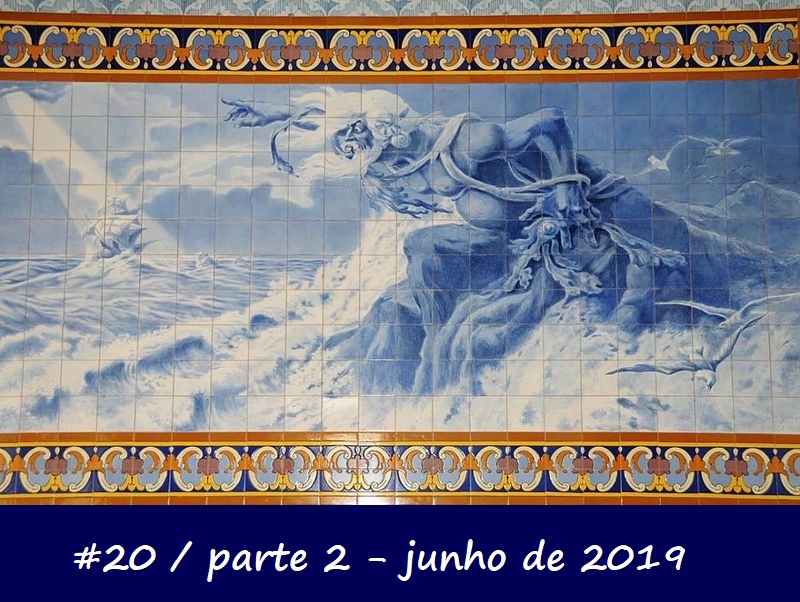Connection Angola-Portugal: the days of flight service of a returned people
DOI:
https://doi.org/10.11606/issn.2175-3180.v11i20p234-250Keywords:
Retornados, Portuguese literature, Comparative literatureAbstract
Abstract: The end of the Portuguese military dictatorship through the Revolution of the Cravos announces the beginning of a new period that if it not only reflects in Portugal, but yes in its colonies, over all in Angola and Moçambique, that start to project its processes of independence and construction of a nation made for and for Africans. As result, about half million of Portuguese they are obliged to abandon its houses in Africa and to return for the Metropolis. This work has for objective to tell on these trips portraied in workmanship S.O.S Angola, of the journalist Rita Garci'a. As theoreticians, a literary introduction is used, of the professor Carlos Reis and the concepts of geometry of the memory, the António researchers Souza Ribeiro and Margarida Caulker Ribeiro and of Diáspora, with Stuart Hall.
Downloads
References
AUERBACH, Erich. Mímesis – a representação da realidade na literatura ocidental. São Paulo: Perspectiva, 1971.
BARTHES, Roland. O efeito do real. In __________. O Rumor da língua. São Paulo: Martins Fontes, 2004.
BURKE, Peter. A Revolução francesa da historiografia: a Escola dos Annales (1929-1989). São Paulo: Ed. UNESP, 1992.
FIGUEIREDO, Isabela. Caderno de memórias coloniais. 5.ed. Coimbra: AngelusNovus, 2011.
GARCIA, Rita. S.O.S. Angola: Os dias da Ponte Aérea. Lisboa: Oficina do Livro, 2011.
GONÇALVES, Leandro Pereira; PAREDES, Marçal de Menezes. Depois dos Cravos: Liberdades e independências. Porto Algre: EDIPUCRS, 2017.
HALL, Stuart. Da diáspora: Identidades e Mediações Culturais. Minas Gerais: UFMG, 2008.
MENEZES, Solival. Mamma Angola: Sociedade e Economia de um País Nascente. São Paulo: Edusp, 2000.
NETO, Maria da Conceição. Maria do Huambo: Uma vida de “indígena”. Colonização, estatuto jurídico e discriminação racial em Angola (1926-1961). In África: Revista do centro de estudos africanos. São Paulo: USP, 2005, p. 119-127.
PEARCE, Justin. A Guerra Civil em Angola: 1975-2002. Lisboa: Tinta da China, 2017.
REIS, Carlos. O Conhecimento da Literatura: uma Introdução aos Estudos Literários, 2 ed. Porto Alegre: EDIPUCRS, 2013.
RIBEIRO, Antônio Souza; RIBEIRO, Margarita Calafate. Geometrias da Memória: Configurações Pós-coloniais. InRIBEIRO, Antônio Souza; RIBEIRO, Margarita Calafate (orgs.). Geometrias da Memória: Configurações Pós-coloniais. Porto: Afrontamento, 2016.
SCHUBERT, Joe. 2013. Democratização e consolidação do poder político em Angola no pós-guerra. Disponível em:http://www.scielo.mec.pt/pdf/ri/n37/n37a07.pdf. Acesso em: 03 de junho de 2018.
SECCO, Lincoln. Trinta anos da Revolução dos Cravos in Revista Adusp, 33 ed. São Paulo: USP. Outubro de 2004.
Downloads
Published
Issue
Section
License
Copyright (c) 2019 Pietro Gabriel dos Santos Pacheco

This work is licensed under a Creative Commons Attribution-NonCommercial 4.0 International License.
O(s) autor(es) declara(m) automaticamente ao enviar um texto para publicação na revista Desassossego que o trabalho é de sua(s) autoria(s), assumindo total responsabilidade perante a lei nº 9.610, de 19 de fevereiro de 1998, no caso de plágio ou difamação, obrigando-se a responder pela originalidade do trabalho, inclusive por citações, transcrições, uso de nomes de pessoas e lugares, referências histórias e bibliográficas e tudo o mais que tiver sido incorporado ao seu texto, eximindo, desde já a equipe da Revista, bem como os organismos editoriais a ela vinculados de quaisquer prejuízos ou danos.
O(s) autor(s) permanece(m) sendo o(s) detentor(es) dos direitos autorais de seu(s) texto(s), mas autoriza(m) a equipe da Revista Desassossego a revisar, editar e publicar o texto, podendo esta sugerir alterações sempre que necessário.
O autor(s) declara(m) que sobre o seu texto não recai ônus de qualquer espécie, assim como a inexistência de contratos editoriais vigentes que impeçam sua publicação na Revista Desassossego, responsabilizando-se por reivindicações futuras e eventuais perdas e danos. Os originais enviados devem ser inéditos e não devem ser submetidos à outra(s) revista(s) durante o processo de avaliação.
Em casos de coautoria com respectivos orientadores e outros, faz-se necessária uma declaração do coautor autorizando a publicação do texto.
Entende-se, portanto, com o ato de submissão de qualquer material à Revista Desassossego, a plena concordância com estes termos e com as Normas para elaboração e submissão de trabalhos. O não cumprimento desses itens ou o não enquadramento às normas editoriais resultará na recusa do material.


